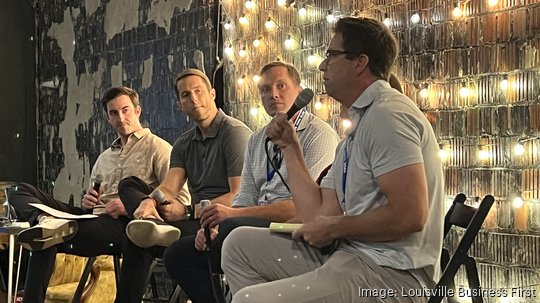
It could happen there, it could happen here. All it takes is one company.
In the realm of the entrepreneurial ecosystems across the country, the narrative remains like a steady drum beat.
On Tuesday night, that song was played again at the 2nd and Main event space in downtown Corbin, Kentucky, at a live podcast that was being recorded for an upcoming episode of Lexington-based Middle Tech, following the first day of the SOAR (Shaping Our Appalachian Region) Summit.
Near the end of the event that looked into the startup scene in Eastern Kentucky, Middle Techco-host Logan Jones asked a panel of four to lend some perspective on the AppHarvest situation — the ag tech startup that many thought at one point would be “the one” for Eastern Kentucky through the creation of four massive indoor farms.
As we have chronicled over the months, the Morehead-based company filed for bankruptcy in July, among other headlines, including founder Jonathan Webb stepping down as a CEO that same month.
It was only in November 2022, that the company had been named one of our Inno Fire award winners after it created approximately 700 jobs in Eastern Kentucky. That same month, Webb said that the company had raised almost $1 billion in debt and equity.
“What we all need to realize is that this happens all the time,” said Geoff Marietta, chief impact officer at the Foundation for Appalachian Kentucky, the founder of Invest 606, and owner of the building itself. “I think the issue is that the stakes are much higher in Eastern Kentucky.”
Marietta — who announced that there would be a launch of a “Southeast Kentucky Angel Fund” on the horizon, which would most likely look to approach $1 million (stay tuned) — went on to inform the crowd that out of 100 investments in the venture capital (VC) world, three of those may be “home runs,” 10 might be OK, 10 might break even and the rest will fail.
“The problem that I see is not AppHarvest, but the promises, and the fanfare, and the ribbon cutting, and all of the crap that happened before the company even started to make revenue," Marietta said.
Jones offered his opinion, mentioning the conundrum that was caused when it was operating like a tech company with high margins, but trying to apply that way of thinking to the traditional low-margin world of agriculture.
“We can… try to pick apart AppHarvest,” Marietta replied, “But it’s a symptom of a larger problem that we have in the United States — free easy money, being invested in things that are very risky, but but also potentially very, very profitable.”
One of the panelists was J.P. Blevins, a Kentucky native and former University of Kentucky basketball player (1998-02) who recently moved back to Lexington after serving several roles and being an initial investor in Live Oak Bank (NYSE: LOB) and later its spinoff company nCino (Nasdaq: NCNO).
“It would be really unfortunate if people looked at AppHarvest, and that was a deterrent to not really try to do something in the state of Kentucky,” Blevins told the crowd.
For more than 13 years, Blevins called Wilmington, North Carolina, home, a town that he said at the time had about a third of the population of Lexington. He moved there as a 28-year-old to follow the dream of a fellow Kentuckian, Chip Mahan, who envisioned customers banking primarily on their phones well before others in the banking industry did.
Wilmington’s equivalent to coal was textiles, an industry that had been moved mostly overseas when he arrived. Then Live Oak Bank, specializing in small business loans, and nCino became publicly traded companies and created a ripple effect that is akin to the ExactTarget phenomenon in Indianapolis, where former employees reinvested in the community’s ecosystem.
“I’d love to have five AppHarvest chances, right?,” said Lincoln Brown, another Lexington-based investor, who also gave the examples of Austin, Texas; Boise, Idaho; and Chattanooga, Tennessee. “You just hope one of them breaks through, right? Because it can change Eastern Kentucky forever. … It just takes one."






